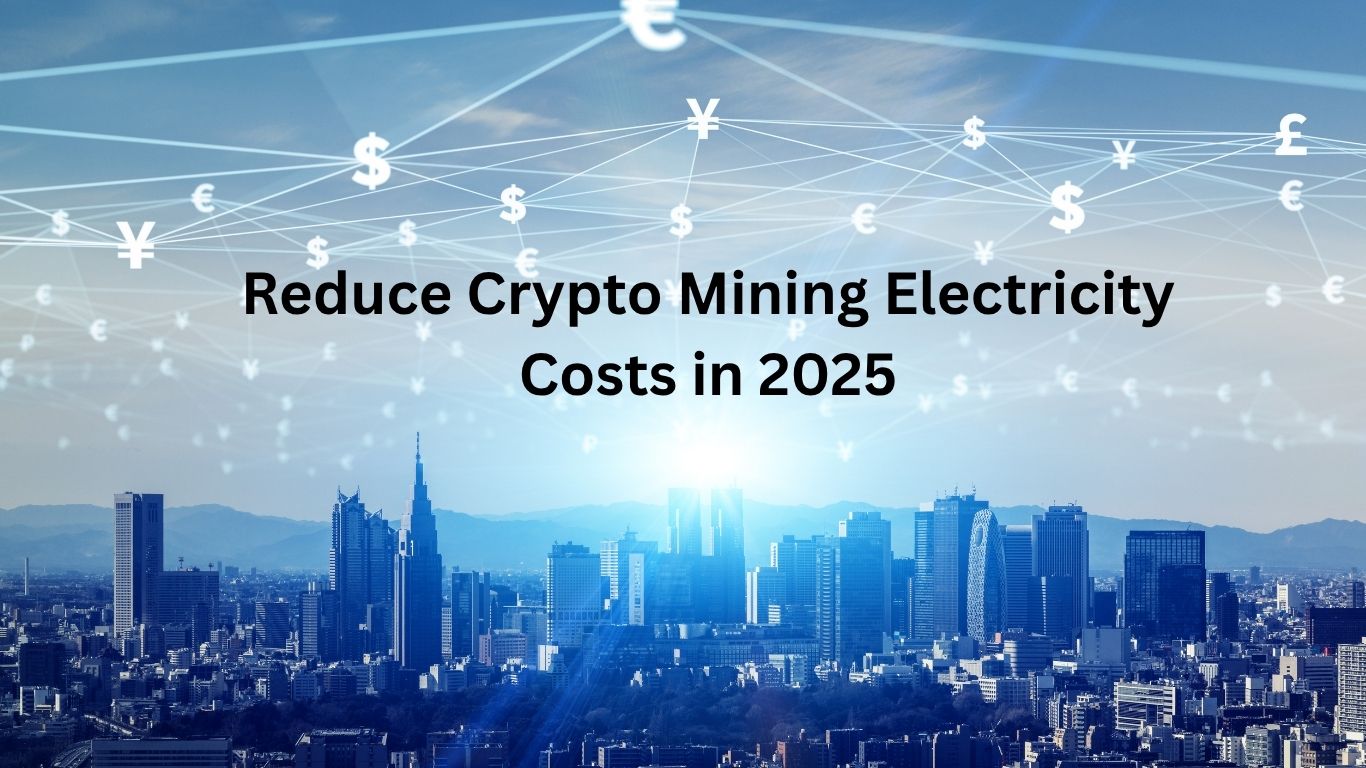In 2025, the biggest expense for crypto miners—whether hobbyists or full-time professionals—is electricity. As mining difficulty increases and block rewards shrink, reducing your mining electricity costs is essential to staying profitable. In this guide, we’ll explore smart ways to cut power usage, boost efficiency, and even switch to renewable energy.
Table of Contents
- 1 Why Electricity Costs Matter More Than Ever
- 2 1. Hardware Efficiency: Choose the Right Miners
- 3 2. Optimize Your Setup for Power Efficiency
- 4 3. Switch to Renewable Energy Sources
- 5 4. Location, Location, Location
- 6 5. Monitor & Automate to Avoid Wastage
- 7 Bonus: Mine Energy-Efficient Coins
- 8 Final Thoughts: Smart Mining in 2025
Why Electricity Costs Matter More Than Ever
Electricity consumption directly impacts your mining profit margins. Even the most powerful GPU or ASIC miner will bleed cash if you’re paying high rates for electricity.
- In the U.S., residential rates average $0.16–$0.22/kWh, while industrial zones in mining-friendly states (like Texas) can offer below $0.07/kWh.
- Mining profitability is tighter in 2025 due to market fluctuations and halving cycles.
So, lowering energy usage and optimizing your setup isn’t just smart — it’s survival.
1. Hardware Efficiency: Choose the Right Miners
Modern mining hardware is significantly more power-efficient than older models. Whether you’re mining with GPUs or ASICs, focus on performance-per-watt (efficiency).
Best Practices:
- Use latest-gen GPUs like the RTX 4070/4080 or AMD RX 7900 series for better hashrate per watt.
- For ASICs, choose units like the Antminer S21 or WhatsMiner M60, known for top-tier efficiency.
- Avoid running older cards like GTX 1060 or RX 580 — they’re inefficient in 2025.
2. Optimize Your Setup for Power Efficiency
Even powerful hardware wastes energy without optimization.
Energy-Saving Tips:
- Undervolt GPUs and tweak clock speeds to reduce consumption without major hashrate loss.
- Use efficient power supplies (80+ Gold or Platinum) to reduce energy loss during conversion.
- Improve airflow and cooling — high temps increase power draw. Use high-efficiency fans and avoid overheating.
- Turn off unnecessary devices and use smart power strips.
3. Switch to Renewable Energy Sources
Many miners are moving to solar or wind power to slash long-term energy bills and minimize environmental impact.
Why Go Renewable in 2025?
- Federal tax credits for solar setups still apply in the U.S.
- Once installed, solar panels can provide free energy for 20+ years.
- You may be able to sell excess energy back to the grid (net metering).
Getting Started:
- Install a solar mining rig if you live in a sunny region like Texas, Arizona, or Nevada.
- Combine with battery storage (e.g., Tesla Powerwall) to mine during nighttime or grid outages.
4. Location, Location, Location
Electricity rates vary drastically across the U.S. Choosing the right state can halve your electricity cost.
Best States for Low-Cost Mining in 2025:
| State | Avg. Industrial Electricity Rate |
|---|---|
| Texas | $0.06 – $0.08 per kWh |
| Wyoming | $0.07 – $0.09 per kWh |
| Georgia | $0.08 – $0.10 per kWh |
If relocating is an option, consider these crypto mining hubs with cheap power and pro-crypto laws.
5. Monitor & Automate to Avoid Wastage
Use tools that help track and optimize power usage:
- Mining software like HiveOS or NiceHash shows power draw in real-time.
- Smart plugs with app control let you schedule mining hours during off-peak rates.
- Use automated scripts to shut down rigs when crypto prices dip below break-even.
Bonus: Mine Energy-Efficient Coins
Not all coins are equal when it comes to energy consumption.
Lower-Energy Mining Options:
- Kaspa (KAS): GPU-friendly and efficient
- Ergo (ERG): Less power-hungry than ETH-era coins
- Litecoin (LTC): ASIC-friendly, with low-power models available
Focus on coins with low network difficulty and higher rewards-to-power ratio.
Final Thoughts: Smart Mining in 2025
Reducing electricity costs in crypto mining isn’t about luck — it’s about efficiency, planning, and leveraging technology. Whether you’re tweaking your rig, switching to solar, or relocating to a mining-friendly state, every kilowatt saved is money earned.
Next Reads:







Leave a Reply